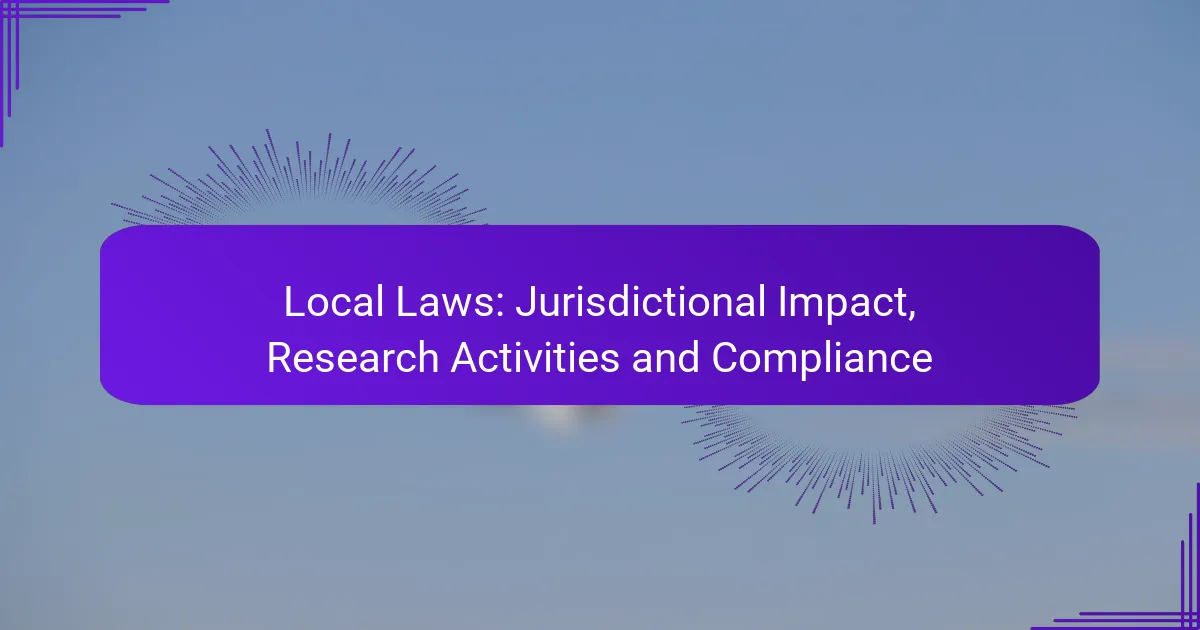Local laws play a crucial role in shaping research activities in the United States by providing a regulatory framework that governs compliance, ethical standards, and operational guidelines. Researchers must navigate these varying regulations, particularly in states like California, where adherence to laws, Institutional Review Board (IRB) approval, and data privacy are essential for ethical research practices. Staying informed and employing effective compliance strategies are vital for researchers to protect participants and uphold integrity in their work.

How do local laws impact research activities in the United States?
Local laws significantly influence research activities in the United States by establishing the framework within which research must operate. These laws dictate compliance requirements, ethical standards, and specific guidelines that vary by state and institution.
Compliance with federal regulations
Research activities in the U.S. must adhere to federal regulations, which include guidelines from agencies such as the National Institutes of Health (NIH) and the Food and Drug Administration (FDA). These regulations often cover areas like human subject protection, data privacy, and the use of controlled substances in research.
Researchers should ensure they are familiar with applicable federal laws, as non-compliance can lead to significant penalties, including loss of funding or legal action. Regular training and updates on federal regulations are advisable to maintain compliance.
State-specific research guidelines
Each state may have its own set of research guidelines that complement federal regulations. These can include specific requirements for conducting clinical trials, environmental assessments, or handling sensitive data. For example, California has stringent data privacy laws that researchers must follow when dealing with personal information.
Researchers should consult their state’s health department or research oversight body to understand local requirements. Ignoring state-specific guidelines can result in delays or halts in research activities.
Institutional review board requirements
Institutional Review Boards (IRBs) are essential for overseeing research involving human participants. They ensure that ethical standards are met and that participants’ rights are protected. IRBs review research proposals to assess risks, benefits, and informed consent processes.
Researchers must submit their proposals to an IRB before commencing their studies. It is crucial to allow sufficient time for the review process, which can take several weeks. Failure to obtain IRB approval can lead to serious repercussions, including project termination.

What are the key compliance requirements for research in California?
Key compliance requirements for research in California include adherence to state laws, obtaining Institutional Review Board (IRB) approval, and ensuring data privacy. Researchers must navigate these regulations to protect participants and maintain ethical standards.
California Health and Safety Code
The California Health and Safety Code outlines various regulations that govern research activities, particularly those involving human subjects. It mandates that researchers comply with ethical standards and obtain necessary permits, especially for studies involving health-related data or interventions.
Researchers should familiarize themselves with relevant sections of the code, such as those addressing informed consent and the handling of hazardous materials. Non-compliance can lead to penalties, including fines or the suspension of research activities.
Institutional Review Board (IRB) protocols
Institutional Review Boards (IRBs) are essential for overseeing research involving human subjects in California. Researchers must submit their study proposals to an IRB for review to ensure ethical considerations are met, including participant safety and informed consent.
IRB protocols typically require detailed documentation of the study design, participant recruitment methods, and data management plans. It is crucial to allow sufficient time for the review process, as approvals can take several weeks.
Data privacy laws in California
California has stringent data privacy laws that impact research activities, notably the California Consumer Privacy Act (CCPA). Researchers must ensure that personal data is collected, stored, and processed in compliance with these regulations, which grant consumers rights over their personal information.
Key considerations include obtaining explicit consent from participants for data use and implementing robust data protection measures. Researchers should conduct regular audits to ensure compliance and avoid potential legal repercussions, including fines or lawsuits.

How can researchers ensure compliance with local laws?
Researchers can ensure compliance with local laws by staying informed about relevant regulations and implementing effective strategies. This includes regular training, utilizing specialized software, and consulting with legal experts to navigate complex legal landscapes.
Regular legal training sessions
Conducting regular legal training sessions is essential for researchers to understand their obligations under local laws. These sessions should cover topics such as data protection, intellectual property rights, and ethical research practices. Aim for at least quarterly training to keep everyone updated on any changes in legislation.
Incorporating case studies and real-life scenarios during training can enhance understanding and retention. This approach helps researchers recognize potential legal pitfalls and learn how to avoid them in their work.
Utilizing compliance management software
Compliance management software can streamline the process of adhering to local laws by automating tracking and reporting. These tools often include features for document management, risk assessment, and compliance audits, making it easier for researchers to maintain oversight.
When selecting software, consider options that offer customizable templates and alerts for regulatory updates. This ensures that researchers are always aware of their compliance status and can act swiftly to address any issues.
Consulting with legal experts
Consulting with legal experts is a critical step for researchers, especially when dealing with complex regulations. Legal professionals can provide tailored advice based on the specific research context, helping to mitigate risks associated with non-compliance.
Establishing a relationship with a legal advisor can facilitate ongoing support and guidance. Researchers should consider scheduling regular check-ins to discuss any emerging legal concerns or changes in local laws that may impact their work.

What are the consequences of non-compliance with local laws?
Non-compliance with local laws can lead to significant legal and financial repercussions for individuals and institutions. These consequences can manifest as legal penalties, loss of funding, and damage to reputation, all of which can severely impact ongoing and future research activities.
Legal penalties and fines
Legal penalties for non-compliance can vary widely depending on the jurisdiction and the specific laws violated. Institutions may face fines ranging from hundreds to millions of dollars, depending on the severity of the infraction. In some cases, individuals may also face criminal charges, leading to potential imprisonment.
It is crucial for researchers to understand the specific legal requirements in their area, as regulatory bodies often impose strict guidelines. Regular audits and compliance checks can help identify potential issues before they escalate into legal problems.
Impact on research funding
Non-compliance can jeopardize existing research funding and hinder future grant applications. Funding agencies often require strict adherence to local laws and regulations, and any violations can lead to immediate withdrawal of financial support. This can be particularly detrimental for projects that rely heavily on external funding sources.
To mitigate this risk, institutions should establish robust compliance programs that include training for researchers on relevant laws and regulations. Maintaining transparent communication with funding bodies can also help in addressing any compliance concerns proactively.
Reputation damage for institutions
Failure to comply with local laws can severely damage an institution’s reputation, affecting its credibility and standing in the academic community. Negative publicity from legal issues can deter potential collaborators, students, and funding sources, leading to long-term consequences.
To protect their reputation, institutions should prioritize compliance and ethical research practices. Engaging in regular training and fostering a culture of accountability can help ensure that all staff understand the importance of adhering to local laws.

What frameworks exist for understanding jurisdictional impact?
Understanding jurisdictional impact involves recognizing how different legal frameworks interact and influence research activities and compliance. Key frameworks include federal and state laws, as well as established case law precedents that shape legal interpretations and enforcement.
Federal vs. state jurisdiction
Federal jurisdiction refers to the authority of national laws and regulations, which typically apply across all states. In contrast, state jurisdiction encompasses laws specific to individual states, which can vary significantly in areas such as environmental regulations, business compliance, and public health.
When conducting research or business activities, it is crucial to identify which jurisdiction applies. For instance, a company operating in multiple states must comply with both federal regulations, like the Clean Air Act, and state-specific laws, which may impose stricter standards.
Case law precedents
Case law precedents are judicial decisions that establish legal principles and interpretations, influencing future cases. These precedents can clarify the application of laws within both federal and state jurisdictions, providing guidance on compliance and legal expectations.
For example, a landmark Supreme Court ruling may set a standard that affects how federal laws are interpreted across the country. Similarly, state court decisions can create binding precedents that impact local compliance requirements. Researchers and businesses should regularly review relevant case law to stay informed about potential legal changes and implications for their activities.

How do local laws vary across different states?
Local laws can differ significantly from state to state, affecting everything from business regulations to personal rights. Understanding these variations is crucial for compliance and effective decision-making in any jurisdiction.
Comparative analysis of state laws
State laws are shaped by local culture, economic conditions, and political climates, leading to diverse legal frameworks. For instance, some states may have strict environmental regulations, while others prioritize business-friendly policies. This can impact industries such as construction, manufacturing, and agriculture differently across the country.
When comparing state laws, consider key areas such as taxation, labor laws, and zoning regulations. For example, states like California and New York often have higher taxes and more stringent labor protections compared to states like Texas or Florida, which may offer lower taxes and fewer regulations.
Regional compliance challenges
Compliance challenges can arise due to the complexity of navigating different state laws. Businesses operating in multiple states must stay informed about varying regulations to avoid legal issues. For example, a company may face different licensing requirements or labor laws depending on the state, which can complicate operations.
To mitigate compliance risks, organizations should implement a robust legal review process and consider consulting with local legal experts. Regular training for employees on state-specific laws can also help ensure adherence and reduce the likelihood of costly penalties.

What emerging trends are shaping local laws and compliance?
Emerging trends in local laws and compliance are increasingly influenced by technological advancements, globalization, and evolving societal values. These factors drive changes in regulations that organizations must navigate to ensure compliance and mitigate risks.
Technological advancements and their impact on compliance
Technological advancements, particularly in data management and cybersecurity, are reshaping compliance requirements. Organizations must adopt robust data protection measures to comply with regulations like the General Data Protection Regulation (GDPR) in Europe or the California Consumer Privacy Act (CCPA) in the United States.
As technology evolves, businesses should regularly assess their compliance frameworks to incorporate new tools and practices. This may include investing in compliance software that automates reporting and monitoring processes, reducing the risk of human error.
Globalization and its influence on local laws
Globalization has led to a complex interplay of local laws as businesses operate across multiple jurisdictions. Companies must understand and comply with varying regulations in different countries, which can create challenges in maintaining consistent practices.
To navigate this landscape, organizations should establish a comprehensive compliance strategy that includes local legal expertise. This approach ensures that they remain compliant with local laws while aligning with global standards.
Shifts in societal values and regulatory responses
Shifts in societal values, such as increased emphasis on sustainability and corporate social responsibility, are prompting changes in local laws. Governments are introducing regulations that require businesses to adopt environmentally friendly practices and promote social equity.
Organizations should proactively adapt to these changes by integrating sustainability into their business models. This may involve conducting regular assessments of their environmental impact and ensuring compliance with emerging regulations related to sustainability.



